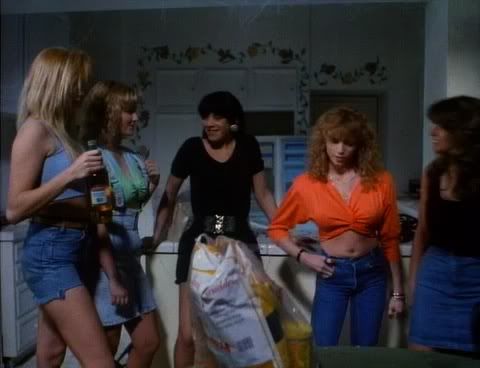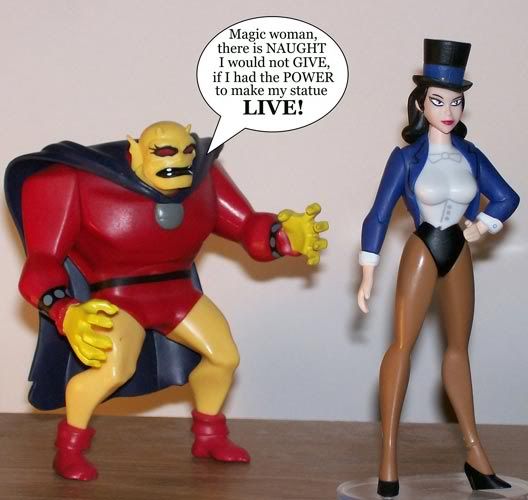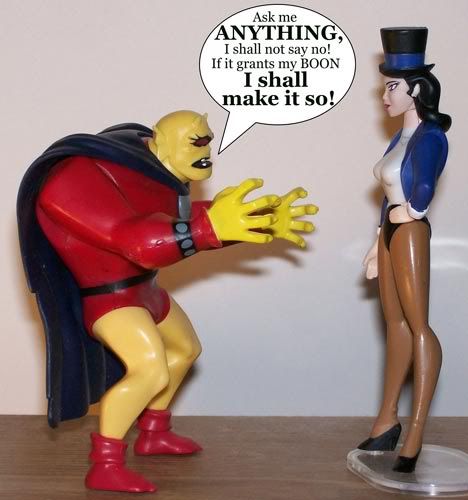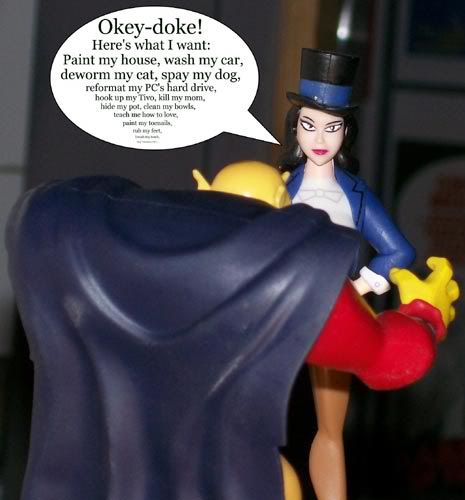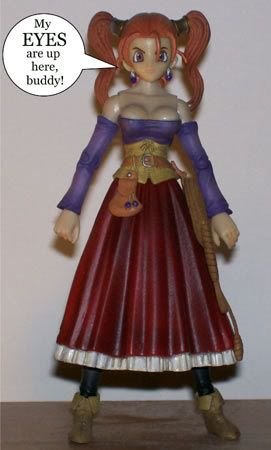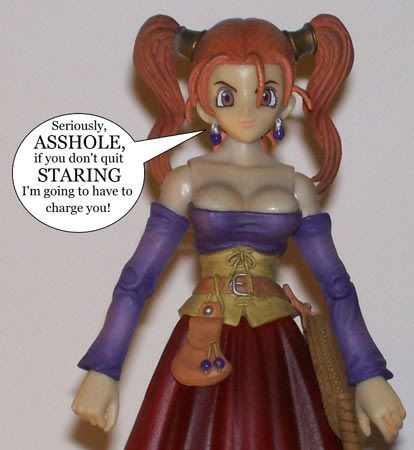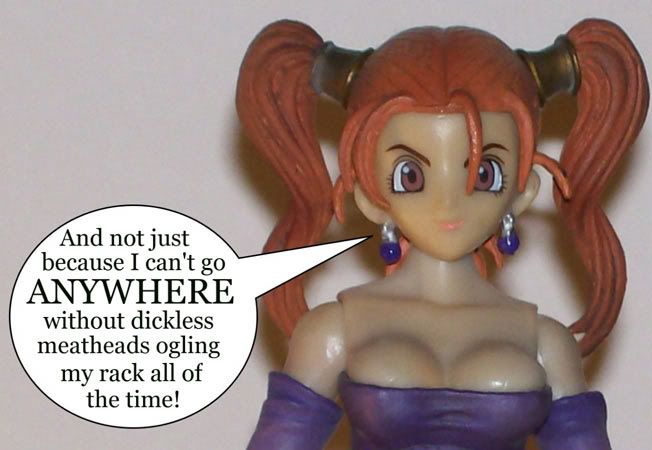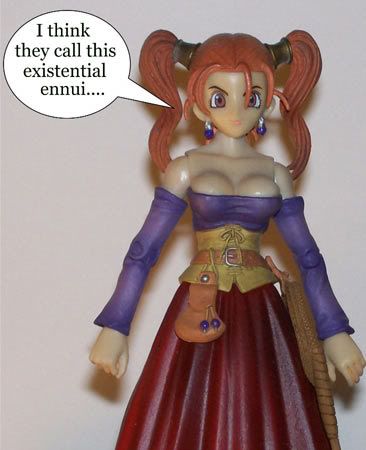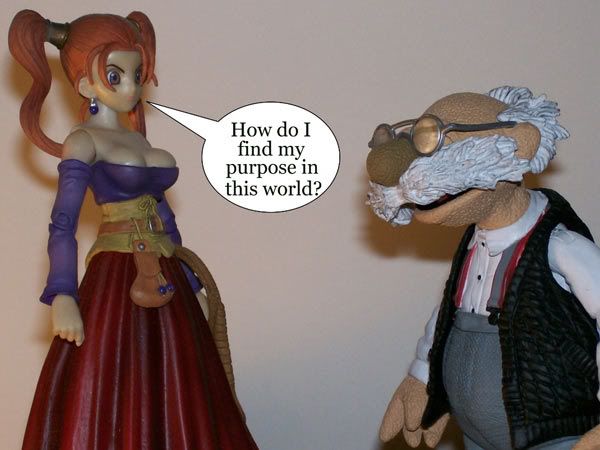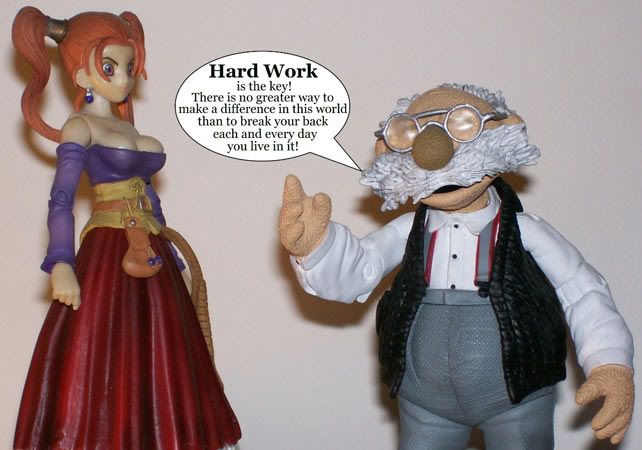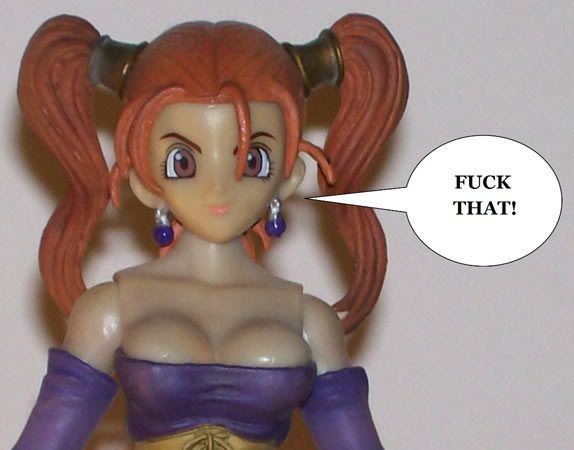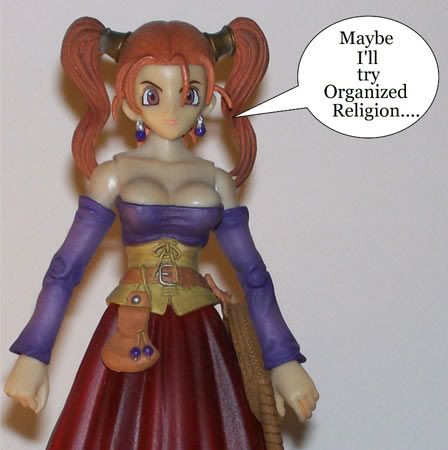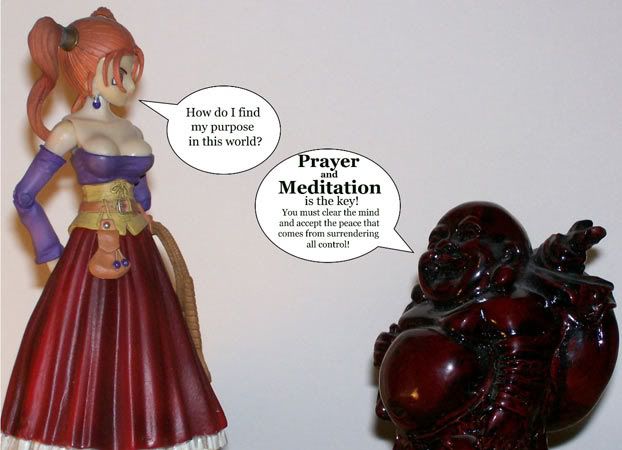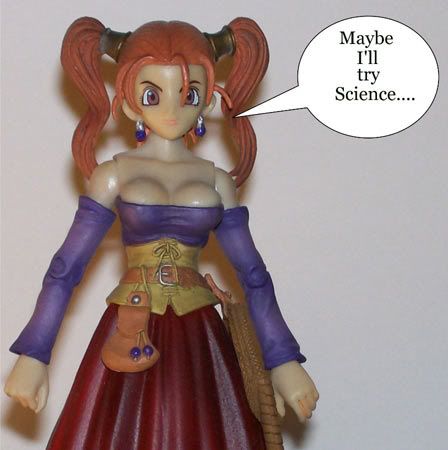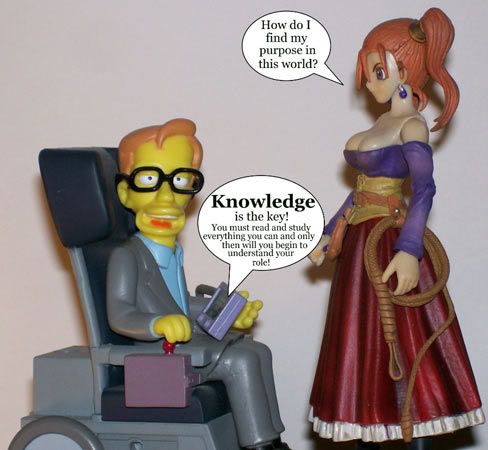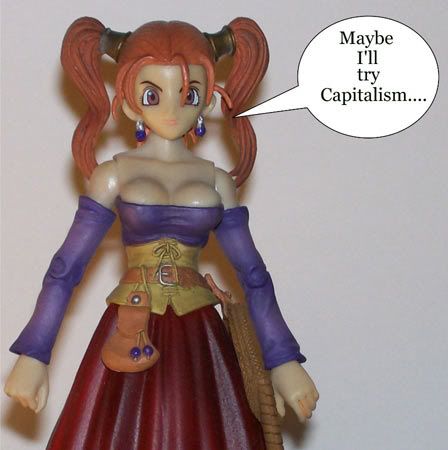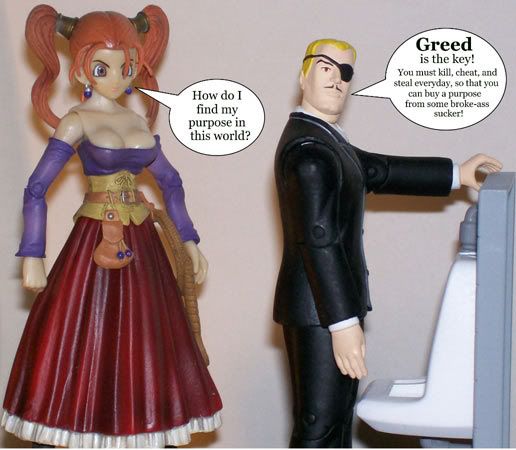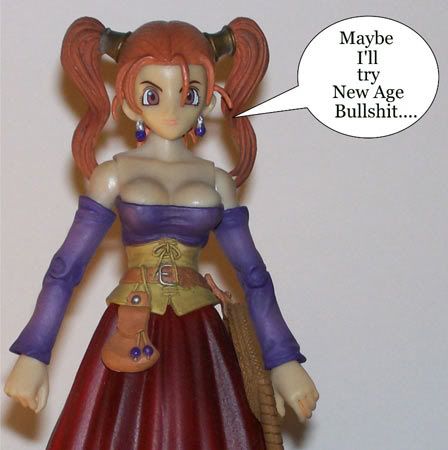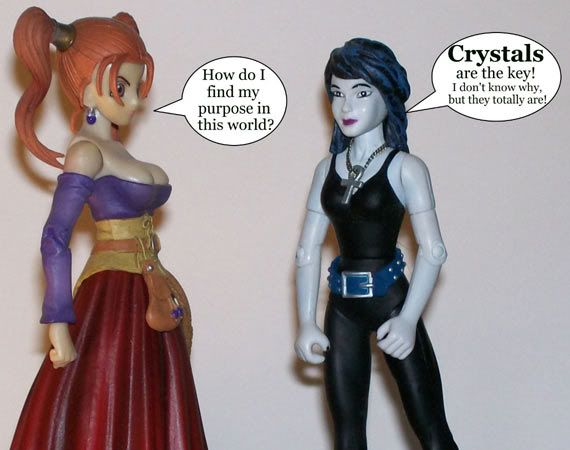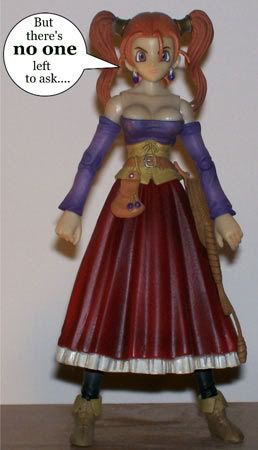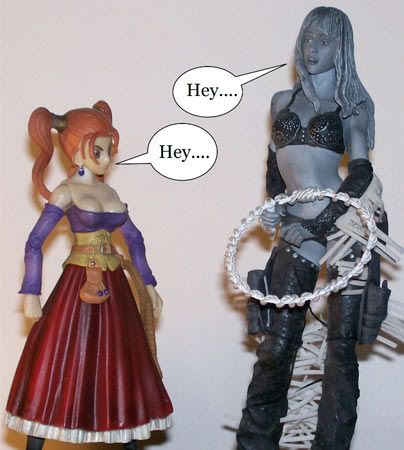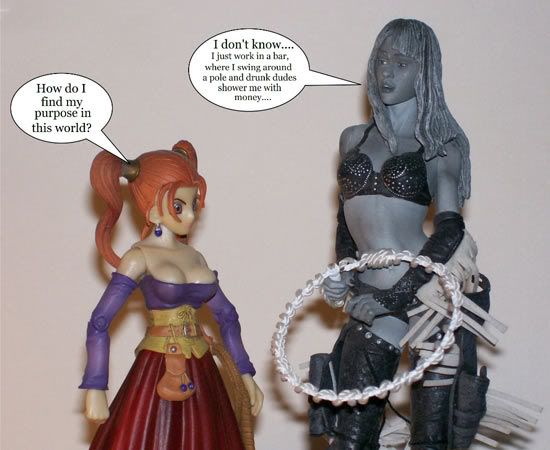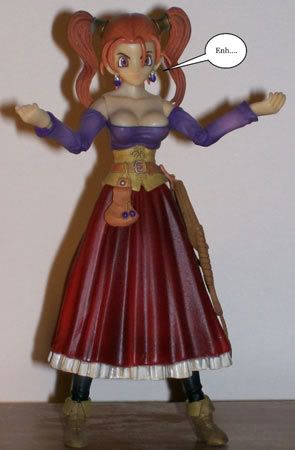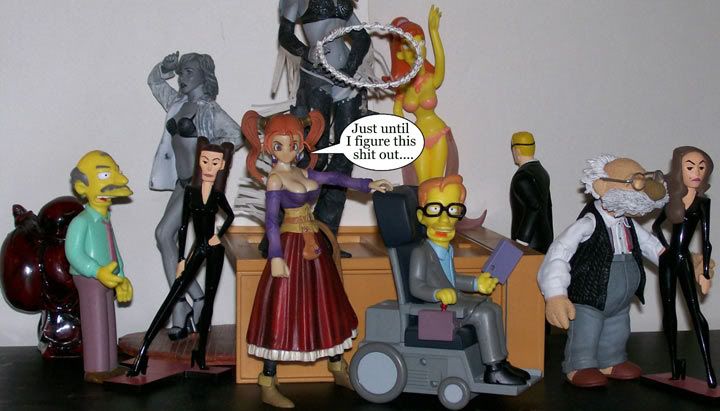I went to an elementary school whose student population included kids with severe mental and physical disabilities, and though they were kept segregated—for the most part—from us in separate classrooms, every effort was always made to include them in all the regular school events and projects. This meant that they always got the chance to perform at the annual Christmas concerts—both the one that was held for the parents at night and the one held for the students during the day—and though I cannot say how people reacted during the night concert, I do know that their performances always elicited two different reactions from the students during the day show. The first reaction was the one chosen by the crueler, more cold-hearted kids—snide mockery. They would laugh and make fun of how badly those retards sang their songs and scoff with disbelief whenever one of the kids forgot the words to their solo or just plain froze with stage fright. They could not believe that anyone would have anything kind to say about such a pathetic display.
Thankfully the other reaction was much more kind. The more empathetic souls amongst us were willing to ignore the obvious faults in the “special” kids’ performance, because a) we knew they were trying their hardest and b) they were obviously having a lot of fun, so when we applauded them we did so with genuine enthusiasm and not with the sarcastic rhythm of our unenlightened peers.
This brings us to the subject at hand—What Were They Thinking Movies (to be referred to here and in the rest of these posts as WWTTM from henceforth). Like the special needs kids at those Christmas concerts you can choose to watch them with a sense of arrogant superiority and derision or you can instead decide to watch them with a more gentle and forgiving eye and allow yourself to be entertained by the misbegotten spectacle of it all.
You should know by now which of these two options I prefer.
The paradox of being a fan of movies like these is that often you find yourself in the weird position of knowing they are awful but unable to bear it when someone actually criticizes them for their faults. The problem usually is the tone of these criticisms, which is invariably the same one the mean kids used when making fun of the disabled kids’ botched rendition of “Rudolph the Red-Nosed Reindeer”. By pointing out all of the obvious flaws of these films, these unkind critics fail to appreciate their sincerity and joie de vive. Of course they suck, but they suck in fun, original ways that make them a blast to watch over and over again. To not get that means that either you take the world far too seriously for your own good or you’re just a major asshole.
The subject of this post’s discussion is a bad movie—I don’t deny it. Like all WWTTM I can’t believe its producers actually thought it could ever be successful, but having said that, when I tell you that I love this movie I don’t mean it in any sort of hip ironic way. I genuinely love this movie not despite its faults, but because of them—because it is completely true to itself and utterly sincere, even during those moments that are so ridiculous they flirt with unintended self-parody.
I am, of course, talking about:
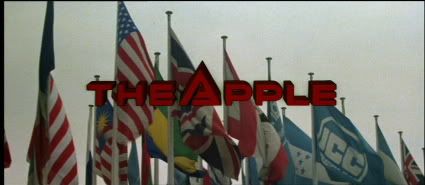
Our humble little movie starts at the WorldVision Song Festival in the year 1994, where the audience is being thrilled to the unheard of degree of 150 heartbeats (don’t ask me to explain what that means, the movie never bothers to tell us) by the biracial duo of Dandi and Pandi, who are on stage performing their hit song “Bim”.
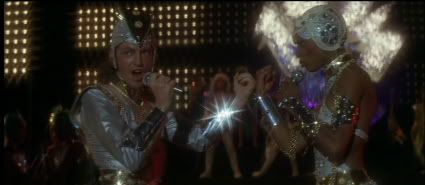
Dandi's the dude and Pandi's not.
It’s an anthemic number that includes such memorable lyrics as:
There ain’t no good!
There ain’t no bad!
There ain’t no happiness!
There ain’t no tears!
There ain’t no love!
There ain’t no hate!
There’s only power!
Bim is the power!
Hey, hey, hey!
Bim’s on the way!
(Repeat)
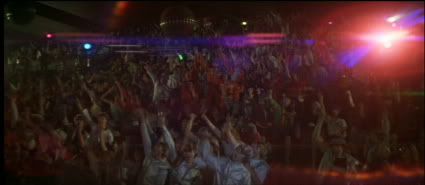
"Hey, hey, hey, Bim's on the way!"
The crowd loves it and who can blame them? Clearly Dandi and Pandi are evil, but damn if the song isn’t one catchy number! As it continues we are introduced to their manager, a thin European-accented gentleman named Mr. Boogalow:
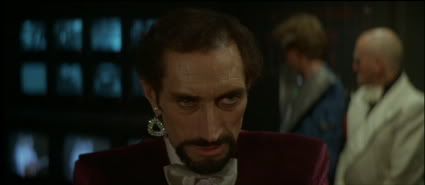
No fair guessing who he really turns out to be!
As well as his number two man, Shake:
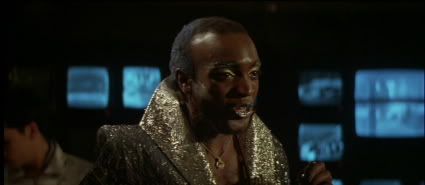
"Hi there! I'm flamboyantly homosexual henchman number one!"
Mr. Boogalow informs his posse that Dandi and Pandi are “magnifique” and that he is going “to turn them into the two biggest stars of the decade”—a statement he makes with such confidence that it suggests it really is only a matter of his desire to do so and not any kind of wishful thinking. But as he and his crew celebrate his belief that the “Bim” song is going to “Take this competition by storm—a-woo-woo-woo!” (No really, he actually says “a-woo-woo-woo“), another duo is introduced onto the stage.
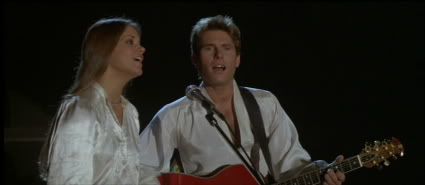
A duo so wholesome they make The Carpenters look like an anorexic nutjob and a self-hating closet-case.
Their names are Alphie and Bibi and they are—as Shake disbelievingly informs his boss—“a couple of kids from Moose Jaw.”
“Moose where?” asks Boogalow.
“I think it’s in Canada,” answers the flunky.
The song these two plucky kids from Saskatchewan choose to perform is a number Alphie wrote entitled “Love Is the Universal Melody”. This surprises the “Bim” folks because everyone knows that love songs are old news. At first it would seem that they are right, as the crowd of teenagers proves initially hostile to the song, but as the wholesome looking duo soldier on the crowd is quieted by lyrics such as:
Alphie:
We belong to one another
We share each other’s destiny
United by our love
We are all children of
The Universal Family
Bibi:
And we are everybody’s brother
And we share the birthright to be free
And deep within your heart
There beats the song of the ages
Both:
The song is the universal melody!
It’s all so beautiful that some in the audience are moved to tears.
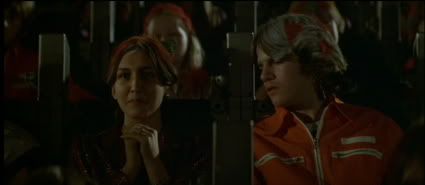
"I guess it is better than the crap you hear on American Idol."
Despite their inexplicably winning over the crowd (inexplicable being the only way to describe it considering a) how bad the song is and b) how unconvincing the crowd’s sudden change of heart really is) Shake insists to his boss that there is no way they can reach Dandi and Pandi’s record of 150 heartbeats, but as he says it, they hit 151. Mr. Boogalow realizes that “Bim” is in danger of losing the competition so he tells Shake to use the red tape. Shake hands the tape over to the engineer and tells him that if anyone sees him use it then he’s “dead, very dead.” The engineer takes the tape and plays it over Alphie and Bibi’s performance. The sounds the tape produces causes the once happy crowd to boo and jeer at the young duo, causing Bibi to break into tears and run off of the stage before the song is over.
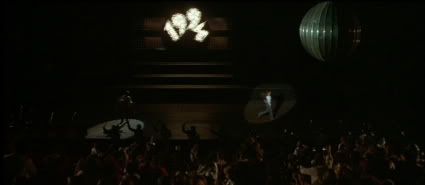
Let's start tallying her faults right now. First, she's a crybaby.
The contest now sewn up and in the bag, Mr. Boogalow is interviewed by reporters from all around the world, whose questions he answers fluently in their native languages. When he finally gets to the reporter from America, a man named Joe Pittman, he is displeased to hear the reporter suggest that the contest was rigged and that it was almost won by another song. Mr. Boogalow takes Pittman aside and tells him that if he reports what he just said, he’ll find himself in the unemployment line. “Joe Pittman,” he tells Shake, “remember that name.”
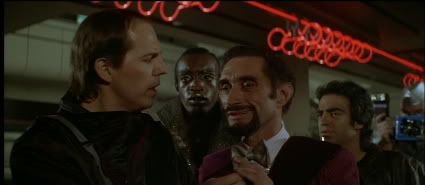
Playing the part of Joe Pittman is the movie's co-lyricist George S. Clinton, who shouldn't be confused with this guy.
Now that the media has been dealt with, everyone returns to Mr. Boogalow’s mansion to celebrate the “Bim” song’s victory.
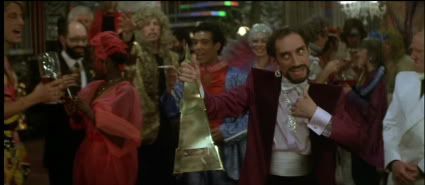
No seriously, it will totally ruin it if you guess who he really is.
And as Boogalow toasts Dandi and Pandi’s achievement, Alphie and Bibi are shown leaving the concert hall, where she is attempting to convince him to accept Boogalow’s invitation to the party now in progress. Alphie doesn’t want to have anything to do with the man, but Bibi—whose dreams of stardom are much more ambitious than her partner’s—insists he could help make them famous and get their songs heard by millions.
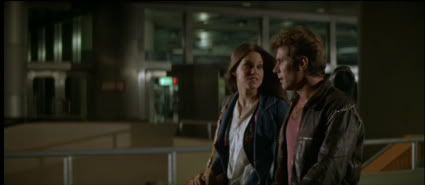
You can now add whiny and craven for stardom to the list.
Meanwhile at the party, Ashley—Boogalow’s merchandising mastermind—introduces his latest invention, the “Bim” mark—a blue triangular sticker that can be worn anywhere on a person’s body.
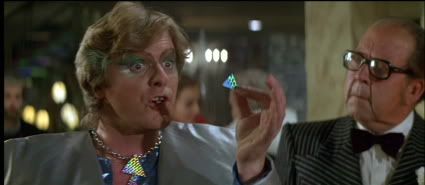
"Hi there! I'm flamboyantly homosexual henchman number two!"
Boogalow is so impressed with this invention he stops the party and tells everyone that—from that moment on—they all have to wear the sticker all of the time to show their devotion to “Bim”.
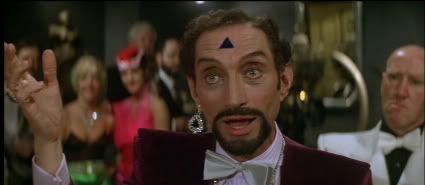
You're guessing right now, aren't you?
Not long after this announcement, Bibi and a very reluctant Alphie arrive at the party. Boogalow quickly separates them, handing Bibi over to Dandi and Alphie over to Pandi. Boogalow offers Alphie a drink, but the young singer refuses it, amusing the guests with the news that he does not drink alcohol. Bibi, however, is more than willing to accept any intoxicant handed her way. This is made clear when Dandi takes her upstairs and offers her a pill, which she—after some coaxing—takes and swallows down.

Write down 'easily corrupted' under 'craven for stardom'.
They then talk for a couple of minutes before Dandi kisses her:
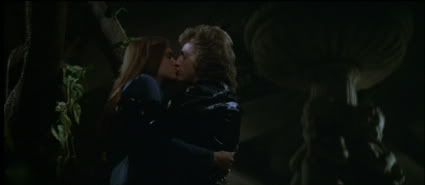
I think that would qualify as 'skanky ho'.
And then informs her in song:
You were made for me
Created for me
And I am your man
You were made for me
It’s fated to be
And you’ll be my woooooo-man!
And though Bibi has known Dandi for less than five minutes and in that time he’s been nothing but an incredible jerk, she finds herself singing back:
How do you do this to me?
Tell me why
The touch of your hand
Has me trembling inside
I don’t understand
This magic I feel
Are you a fantasy
Or are you for real?
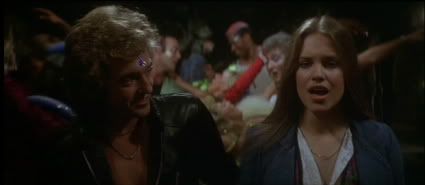
"Explain to me again why I'm singing this song to someone I just met?"
By the time they are finished singing, they are kissing once again, but this time Alphie sees them and puts a stop to this betrayal.
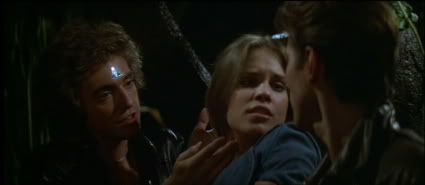
Dude, let her go. She's a--let's check what we have so far--crybaby, whiny, craven for stardom, easily corrupted, skanky ho. Now, aren't you glad we made that list?
Despite having his girl almost stolen from him at the party, Alphie joins Bibi the next day as she goes to meet with Boogalow at his business headquarters. Instead of suggesting that she stop being such a whiny, pill-popping skanky ho, the only thing he says is that they need a lawyer if they are going to consider signing a deal with Boogalow.
“He’s just an agent—he doesn’t own us," Bibi disagrees, before adding, "he’s only taking fifty percent.”
Even when faced with this remarkable logic, Alphie remains unconvinced and the Canadian in him comes out.
“Have you ever seen an American contract?” he asks her. “It’s filled with hundreds of pages of doubletalk—he’ll destroy us!”
“Or make us,” Bibi answers back defiantly.
Since Boogalow is the biggest and most important agent in the world, his lobby is filled with acts desperate to be signed by him. Not limited to musical acts, Boogalow apparently is more than willing to consider taking on clowns, magicians and really cheesy dance acts if the people waiting to see him are any indication.
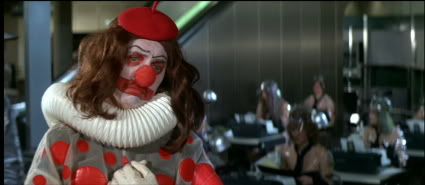
Don't worry. He's smiling on the inside.
Eventually the man everyone is waiting for arrives, just in time to sing a song about his own personal philosophy:
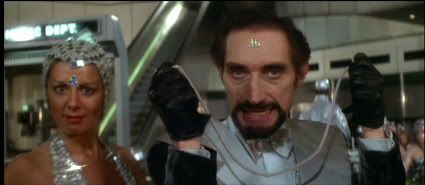
No, he's not really an alien. Now stop guessing!
Like a puppet on a string
Like a monkey on a swing
Man is clinging to the ropes
Of the fantasies and hopes
We are dang-a-ling
He’s so eager to believe
And so easily deceived
Like a baby watching magic
He’s so gullible it is tragic
In a word—naïve
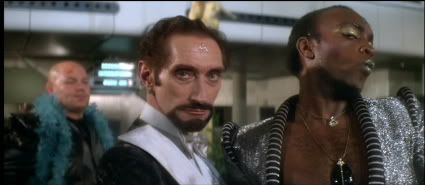
I'm beginning to think he chooses henchmen on their ability to make him look butch in comparison.
He then goes on, with the help of sequined dancers, a clown, a midget, his bodyguards and Shake (all of whom are bedecked with feathered boas) to tell us that:
Life is nothing but show business in 1994!
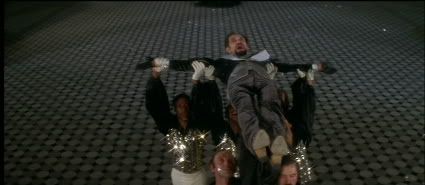
Ha! Fooled Ya! He's definitely not Jesus. Oh shit, that may be a hint. Stop guessing!
While some would hear these lyrics and assume that Boogalow is not exactly someone you would be smart to trust, Alphie (who is still very suspicious) and Bibi (who is pretty much willing to give hand jobs to lepers for a record deal at this point) meet with the man in his office, where he offers them both separate contracts to sign.
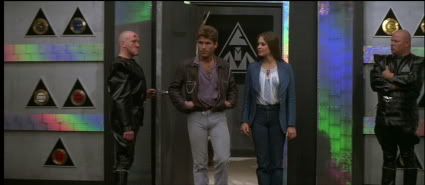
"I may just be a smalltown Canadian boy, but I'm not much impressed with your big city American ways."
Alphie is brazen enough to ask that they be allowed to read the documents before they sign them, only to learn that—even though they haven’t actually recorded it yet—Boogalow has already started selling their first album. “First you sell it,” Shake tells them. “Then you make it,” continues Ashley. “That’s marketing,” the young duo is informed.
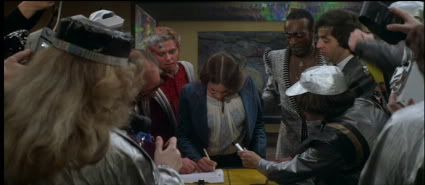
I swear she would willingly blow every guy in that room if they told her to do it. Luckily for her these guys aren't interested in that sort of thing--If you know what I mean. (Hint: they're all gay)
Bibi doesn’t have to hear anymore and eagerly signs the contract. As she does, Alphie watches her and imagines the building starting to shake due to a powerful earthquake. With everyone looking at him like he’s crazy, he reluctantly starts signing the contract, but then he imagines the lights in the room going on and off plunging them into darkness. Someone is sending him a sign and soon Alphie finds himself dreaming that he is in hell, where he and Bibi are dressed as Adam and Eve, while Boogalow is dressed like the Devil and Shake is now a snake.
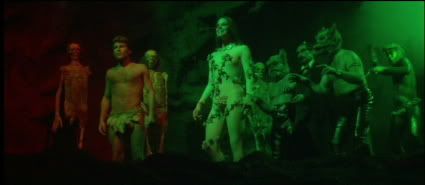
Dude, that's a pretty impressive fig leaf you got there.
Bibi/Eve (rather typically) loves the place, but Alphie/Adam hates it. Boogalow/Devil ignores A/A and focuses all of his attention on the much more receptive B/E. He transforms her fig leaves into a seductive red dress and introduces her to his son Dandi/Anti-Christ. B/D then calls out to Shake/Snake to bring out his “special hors d’oeuvre—the Apple!”
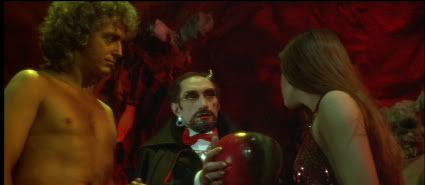
Remember this is only a dream sequence, so anything you see here isn't a clue!
Given the Apple (which appears to be half Red Macintosh and half Granny Delicious) Boogalow then offers it to B/E. “Don’t be afraid,” he tells her in a hushed voice, “taste it.” A/A tries to stop her, but Pandi/Pandi (they apparently couldn’t figure out an analogous biblical character for her) calls out to him and he cannot resist her temptations (Delilah maybe?) The denizens of hell call out to B/E to taste the Apple and are then inspired to break out into another musical number as D/A sings to her:
Magic apple
Mystery apple
Take a little ride
Let me be your guide
Through the Apple paradise!
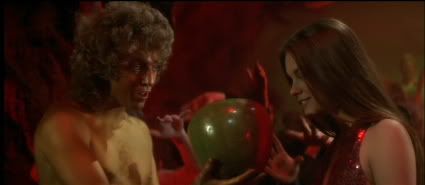
It's both a cheap metaphor and a big piece of fruit!
True to his word he then takes her on a tour of Hell (aka “the Apple paradise”), where he tells her that wanting to try the Apple is:
A natural, natural desire
and then he introduces her to:
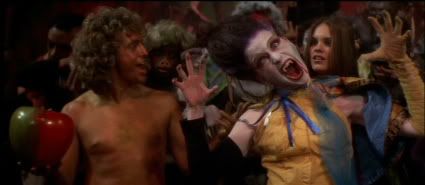
Because vampire rhymes with desire!
An actual, actual vampire!
before urging her to:
Let the Apple set your soul on fire, fire, fire!
because:
You’ll be hypnotized
And you’ll be demonized
And you’ll be paralyzed
So you’ll be victimized
And while Bibi is either too ambitious or stupid (I’m guessing the later) to actually get the message of the song (good things don’t happen to people who taste the Apple), Alphie hears it loud and clear and the dream sequence ends, returning him back to Boogalow’s office where he refuses to sign the contract.
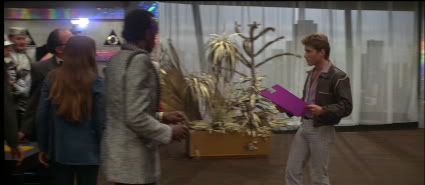
"I may be a smalltown Canadian boy with a vaguely European accent, but I know a bad deal when I see one!"
Mr. Boogalow allows Alphie to leave, but when Bibi tries to follow him, she is stopped by Dandi and Pandi who tell her that Alphie is not her master and that she is free to pursue stardom with them.
Guess who she goes with?
SHE IS SUCH A SKANK! (Sorry, I had to get that out of my system)
But if she has freed herself from Alphie, the song Mr. Boogalow sings over the course of her “stardom-makeover” montage makes it clear that all she has done is turned herself over to another master:
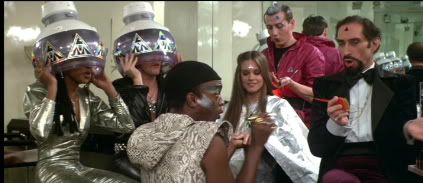
Here Bibi is breaking Allan's First Commandment of Cosmotology--Thou Shalt Not Get Thy Hair Styled By Someone With A Bad Haircut.
Reaching the top
Is such a long hard climb
Millions of people stand and wait in line
Do you think I got there
Being patient and kind?
Yes, I know how to be a master
One really does get the sense that Bibi would have saved everyone a lot of trouble if she just bothered to listen to the lyrics of these songs, but instead she just enjoys the pretty melodies and ignores all the stuff about lying, cheating and stealing to get ahead, not to mention the line about Mr.Boogalow buying souls (could this be a hint towards her agent's true identity? She doesn’t know, because she was too busy getting her hair done to listen!).
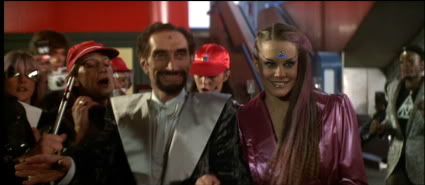
My memories of 1994 are hazy, but I'm pretty certain this wasn't very fashionable.
Her transformation complete, she is introduced to the press who ask her what it’s like for “A girl from nowhere to become America’s number one “Bim” star?” She answers them by saying “It’s frightening, but I put all of my faith in Mr. Boogalow.”
Faith? What a peculiar and highly specific word to use in that sentence.
Finally, after 39 minutes of whining and being altogether skanky, Bibi gets to perform for the whole world, singing a new “Bim” song called “Speed”, which is an upbeat rockin’ ode to America’s devotion to amphetamines:
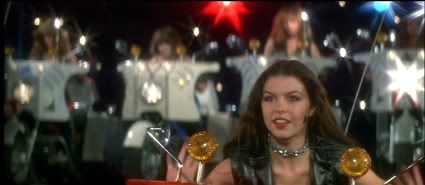
This particular frame has nothing to do with the plot, but it does feature back-up dancer Finola Hughes, who would go on to co-star in an even worse WWTTM musical.
America the land of the free
Is shooting up with pure energy!
And everyday she has to take more
Speeeeeeeeeeeeee-eeeeeeeeeeeedddddddd!
America the home of the brave
Is popping pills to keep up the pace!
And everyday she cries out for more
Speeeeeeeeeeeeee-eeeeeeeeeeeedddddddd!
From New York out to L.A.
Everybody does it her way!
Poppin’ power
By the hour
Speeeeeeeeeeeeee-eeeeeeeeeeeedddddddd!

I won't lie to you. This outfit works for me.
We then cut six months later to a middle-aged Jewish woman who is stopped by a policeman and fined for not wearing a visible “Bim” mark. Apparently in the time that has passed Mr. Boogalow and his “Bim” brand has become so powerful that he now controls the government and is able to enact laws that force everyone in the country to show devotion to him. If you were a suspicious person you might conclude that this “Bim” mark might be more than a tacky fashion accessory but something much more sinister! It turns out that this walking stereotype of all things Semitic is Alphie’s landlady who is constantly reminding him how behind he is in paying his rent, even though—despite her constant nagging—it is clear that she really cares about him and wants him to succeed in show business on his own terms.
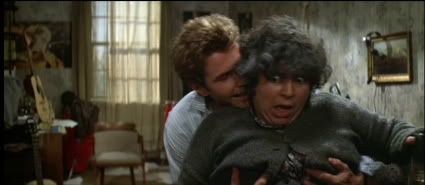
"I may just be a smalltown boy from up north, but I know how to give an older woman a cheap thrill."
Unfortunately, the kinds of songs he writes (sucky love songs) just aren’t what the record companies want, which is all “Bim” all of the time.” Frustrated by his inability to break into the business without selling his soul, he takes time to sit and reflect in a public park, where he is fined for not wearing a “Bim” mark. He tears the ticket up, just as the public address system announces that it is four o’clock, which means—as part of the government’s national fitness program—all citizens are required to stop whatever they are doing and perform the “Bim” dance, an
edict that includes both doctors and patients:
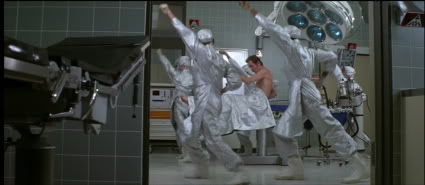
That's what I call a hardcore exercise ethic.
As well as firefighters, the elderly and even--most dastardly of all--nuns:
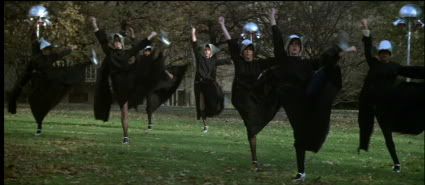
Is it wrong that this really turns me on?
And in the end we discover it is Bibi herself who is singing the song everyone is legally required to dance to.
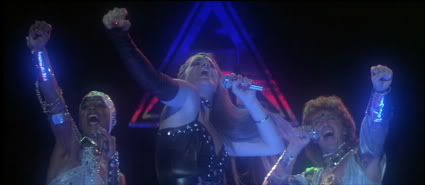
"We are so evil! So evil, evil, evil!"
Alphie happens to be close to the concert hall where Bibi performed the song for the masses, so he is able to watch as his former partner is swarmed by her fans when she leaves to get into her car. Alphie calls out to her and—recognizing his voice--she calls out his name, but before they can reunite, Alphie is grabbed by her bodyguards, who then proceed to smack him around like a little bitch.
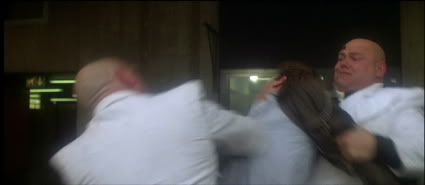
"I may just be a smalltown boy from up beyond the 49th parallel but I still bleed like everyone else."
Seeing Alphie seemingly does something to both Bibi and Pandi. Pandi, now out of the spotlight, seems to have grown tired of the “Bim” lifestyle and Bibi wonders in song just what she gave up when she chose Mr. Boogalow over her hometown boyfriend:
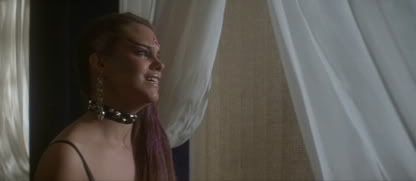
Even skanks have feelings. Who knew?
Allll-phie
Where are you now?
Will I ever see your face again?
You tried to set me free
Knowing all along that your love
Was no match for their evil
You came after me
And because their souls are connected (or something like that) Alphie hears her musical lament and joins her in song as he walks, bruised and battered through the rainy streets on his way back home:
Beeeee-beee
Can you hear me now?
They got me with my back against the wall
There’s no place left to turn
Should I go on living for the memory of your love
Or should I end it all?
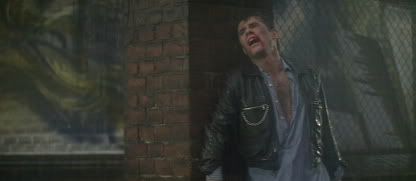
"I may be just a stupid hick from another country, but I know enough about clever choreography to put my back to a wall when I sing 'They got me with my back against the wall'.
He continues:
Cry for me
If there are really angels to hear
Cry for me
Let the heavens rain down
With your tears
Where has all the pity gone?
I sing my song
To deafened ears
Severely weakened by his injuries, Alphie loses consciousness and only awakes several days later to the sight of his worried landlady, who serves him her homemade chicken soup. As she spoon feeds him, she convinces him that if he still loves Bibi he has to try and find her and win her back. He’s reluctant at first, but finally he decides to go to Mr. Boogalow’s mansion and fight for his love. But the “Bim” folks are wily beasts, so instead of beating him up again, they welcome him into the house where Shake hooks him up with Pandi, who—for the moment at least—seems to be back on track with her peeps.
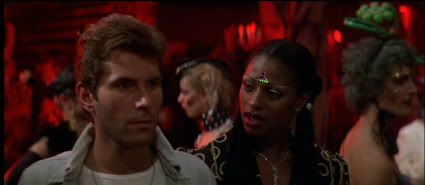
"I may just be an asshole from Moose Jaw, but I likes that hot chocolate flavour!"
The former teetotaler accepts a drink this time, shocked to see that his waiter is Joe Pittman, the reporter who once asked Mr. Boogalow an uncomfortable question—“Bim” now apparently controls the media as well!
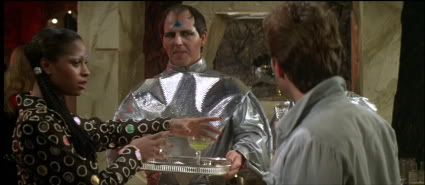
"This is my punishment for writing the words you keep singing."
It turns out that this is the wrong time for non-drinker Alphie to get on the alcohol train, since his beverage is apparently laced with some sort of drug that first causes him to see his host as the Devil:
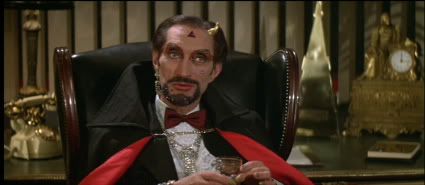
Fuck it. If you haven't guessed who he is by now, you're better off watching less complicated movies starring Pauly Shore.
And then to see the rest of the guests distorted into a cheap camera effect:
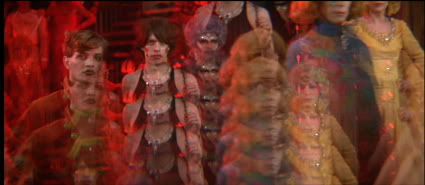
"I may just be a guy who never appeared in another movie, but this is some funky trip!"
Having gotten Alphie into this disoriented state Pandi seduces him with a song:
I’m coming
Coming for you
Now, I’m coming
Coming for you
Let me tempt you
And tease you
And hold you
And squeeze you
And feel every inch of your love
Let me show you
Things you have never dreamed of
Oooooh-ohhhhhhhhh
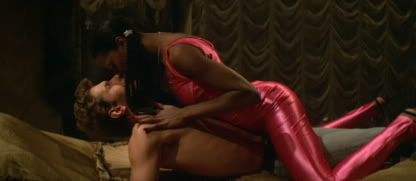
"I may just be--mmmphmphmmmmmmmphhhhhhhhh."
Not even aware of where he is, Alphie does the nasty-nasty with Pandi as he hallucinates a dance sequence featuring couples performing choreographed routines of coitus:
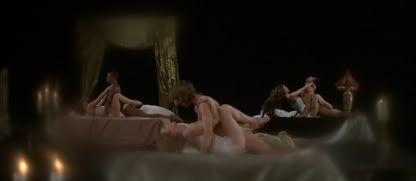
I should have gone into dance instead of doing this stupid writing thing.
Pandi is still tumescent as Alphie finally figures out what is happening to him. He escapes from his bed and looks into another bedroom only to find Bibi in bed with Dandi.
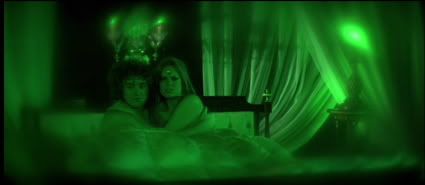
Skanka-skanka-wah-wah!
“Who are you?” she asks him coldly.
“Bibi!” he cries out to her.
“What do you want?” she asks disdainfully before telling him to “Go away.”
Dandi is so delighted by the spectacle that he gets out of bed to watch as Alphie flees the mansion, his heart broken.
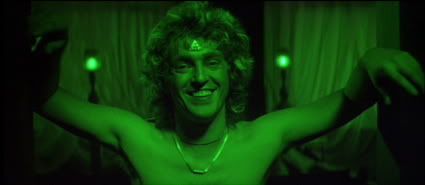
Hey Carmen, am I crazy or does this guy kinda look like Mark if Mark had a bad 80s haircut?
Apparently some time before he could get home, Alphie passed out in the middle of the park, where he is awakened by a guy who looks an awfully lot like god:
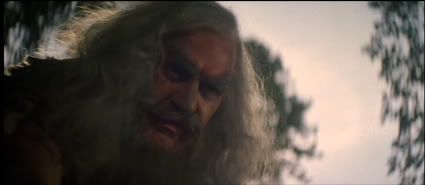
Charleton Heston can go fuck himself.
But who is really just the leader of a group of hippies (and by hippies I don’t mean a bunch of folks who believe in peace and love, grow beards and listen to the Grateful Dead, but actual flower children who somehow managed to survive unchanged over the past two decades). Hippie Leader (as he is named in the credits) offers to adopt Alphie into his fold and Alphie, being only a beard and change of outfit from being a hippie himself, accepts.
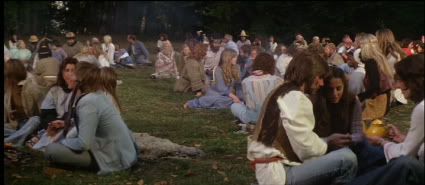
If hippies who looked like this were extinct in 1980--when this movie was made--where did they come from in 1994?
Meanwhile back at “Bim” Manor, Bibi wakes up and is horrified to find out that her vision of Alphie from the night before had not been a dream. Pandi, once again back to her rebellious ways, convinces Bibi that if she really loves Alphie, she should leave her “Bim” stardom behind and find him.
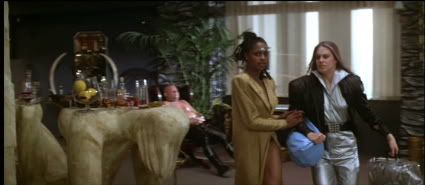
"Girl, I totally scammed your man last night. Holler!"
At first Shake tries to stop her, but he relents and allows her to leave, arrogantly assuming that the power of “Bim” is so strong she will not be able to escape its grasp no matter where she goes.
As Bibi leaves, Pandi goes upstairs and explains to us through song the reason for her sudden change of heart:
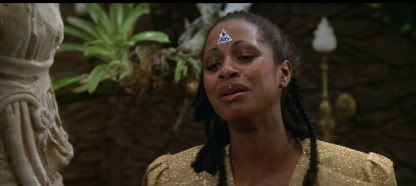
"I swear this sudden turn of character makes sense and it isn't just an awkard plot device!"
Something’s happened to me
Suddenly I’m not the same
I was caught in a maze
So blinded and dazed
I couldn’t remember my name
It’s Pandi. Rhymes with Dandi. She continues:
I was so empty
And numb inside
Now I’m full of feeling again!
I’m laughin’
I’m cryin’
I’m finally alive
I see the light
I feel it all around me
Healing me
Revealing me
I thought that I had died
Looking for Alphie, Bibi first tries his apartment, but his landlady tells her that he doesn’t live there anymore and is now hanging out under a bridge with “all those old bums.”
“Go find him,” the landlady urges her, “he needs ya.”
As she makes her way to the bridge the old bums live under, Bibi joins Pandi in a chorus of the I’m-not-the-skanky-ho-I-used-to-be song, and comes across a guy who looks an awful lot like god, but who is really just one of the old bums the landlady was talking about.
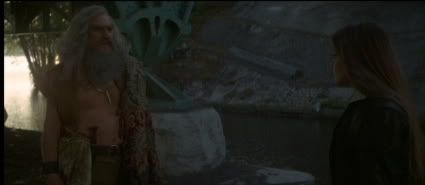
"You're Bibi? Wow, I guess I wasn't expecting such a skank."
The man knows who she is and takes her to meet the man she is searching for. He takes her to the caves where all of the hippies live and there—at long last—Alphie and Bibi, those two crazy kids from Moose Jaw, are reunited. As they stare into each other’s eyes, Alphie removes her “Bim” mark, symbolically freeing her from Boogalow, and they hold each other lovingly as the Hippie Leader sings:
Child of love
Child of laaa-haya-ove!
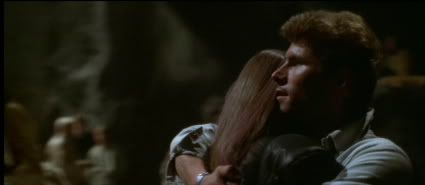
This scene did not make me cry! Something just got into my eye and made it water.
Cut to a year later and the Hippie Leader is still singing, but he is now joined by everyone else, including a bearded Alphie, a flower-powered Bibi and their small child, but before it can even really begin their sing-a-long is interrupted by the po-po.
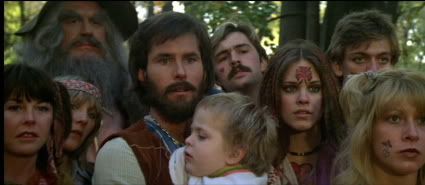
"I may just be an unconvincing actor in a bad musical, but even I deserve a more realistic looking fake beard than this!"
It has taken a year, but Mr. Boogalow has finally found Bibi and wants her arrested for owing him the $10 million he lost in potential earnings when she walked out on her contract. As the police arrest all of the dirty hippies and start taking them away, both Alphie and the Hippie Leader look up to the sky, as if they are expecting someone to arrive.
“It’s going to be all right,” Alphie assures Bibi, “I know he’s coming.”
“Who’s coming?” she asks him.
“Mr. Topps,” he answers cryptically.
“Who’s Mr. Topps?”
“Don’t worry, just trust me. I know he’s coming,” Alphie insists.
And his faith proves warranted when everyone turns to see a golden Cadillac flying in the sky:

You know what? Even in 1980 this would have been considered a crappy special effect.
The car stops in mid-air and out walks a man with long blond hair dressed in a white tuxedo:
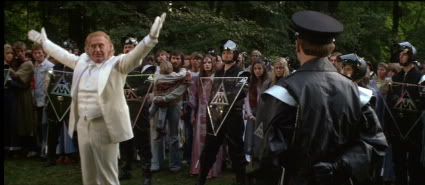
I think the white suit pretty much gives it away.
“Who the hell are you?” shouts out a belligerent police officer.
“They call me Mr. Topps,” the man answers him confidently.
The officer orders another officer to arrest the man, but before the guy can make his move he finds himself frozen in place and paralyzed from the waist down. Mr. Topps then tells Alphie and Bibi to come with him:
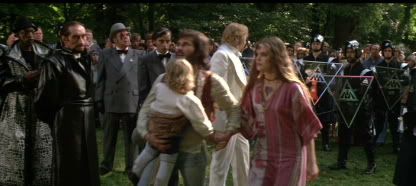
"I'll tell you how I knew about this Mr. Topps guy--who I weirdly never mentioned before--when the movie is over."
But before he starts walking. Mr. Topps is interrupted by Mr. Boogalow.
“Hey, Topps, what do you think you are doing?” asks the sinister agent.
“I’ve had enough of you,” Topps answers him. Boogalow’s lawyers then insist that they have a warrant for Bibi's arrest, but Topps makes it vanish with a snap of his fingers. He then invites all of the hippies to join him and en masse they start following Alphie and Bibi on the invisible stairway to the great gold Cadillac in the sky as a heavenly choir sings “Love is the Universal Melody”.
Despite the fact that she apparently has stayed with the “Bim” folks for the past year, Pandi is sufficiently reformed enough to be allowed to join the hippies, while the rest of her wicked compatriots can only watch with disbelief.
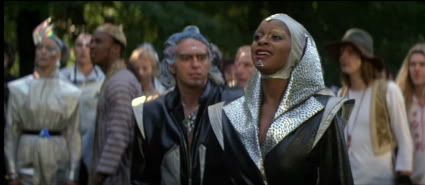
Shouldn't she at least take off that "Bim" thing first?"
“…Where do you think you’re taking them?” Boogalow asks his golden-haired counterpart.
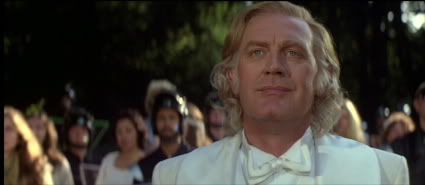
I want to get a wig that looks like that. I think I could really pull it off quite nicely.
“I don’t know yet,” Topps admits. “I’m looking for a new place.”
“A new planet?” wonders Boogalow.
“If I can find one free from your pollution,” answers Topps.
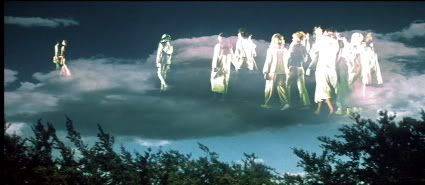
I have no snark left that would properly match the cheesiness of this image.
“Don’t tell me you’re going to start all over again,” Boogalow says snidely.
“Yes,” Topps answers sincerely, “but this time without you.”
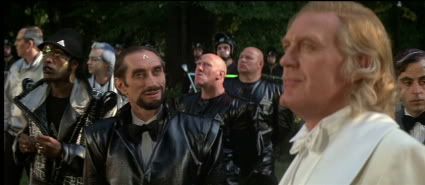
The battle of good and evil, ladies and gentlemen. Thank you and good night.
“Without me?” Boogalow can’t believe his ears. “But my dear Topps you know that is impossible. The world simply cannot exist without me.”
The world can’t exist without another sleazy music agent? Oh wait, I get it! Mr. Boogalow's the devil!
I never saw that one coming!
“Let’s give it a try,” says Topps before he joins the others on their journey to a place without sin.
And, in case you forgot, this has been:
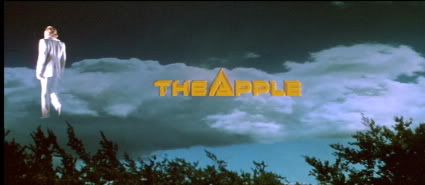
Well that was The Apple. Since this post turned out to be far longer than I thought it was going to be, I’m going to end it here for today and go into my analysis of the film tomorrow. So, until then:

God

Not God
Getting to the Core of The Apple
Why It Sucks As Hard As It Does
Like most WWTTM, The Apple fails largely because it attempts to combine two elements that wiser folks would have determined worked to each other’s detriment. It wants to be a cult midnight movie in the same vein as The Rocky Horror Picture Show and to that end features a tale full of sex, drugs and rock & roll, along with a large dollop of gay camp aesthetic, but it also wants to be a moralistic allegory about the Biblical event known as the Rapture, in which only those who reject the path of sin know the glory of eternal righteousness.
It’s a lethal combination since it is precisely this kind of condescending moralizing that kept midnight movie audiences away from the work of mainstream Hollywood. It also hurts the film since it ultimately suggests that there is something sinful about the camp sensibility the film embraces to tell its story. Even though
Rocky Horror’s chief sexual transgressor, Dr. Frank-N-Furter, is killed at the end of the film, it is obvious that he is not dying for any crimes of sexuality, especially when you consider that at least one of his executors is just as much a transvestite as he is. But in
The Apple the characters whose behavior implies that they are homosexual (the film is actually too tame to make these implications explicit) are clearly on the side of evil—allied as they are to Mr. Boogalow, who is supposed to represent mankind at its evil and most decadent. The result of this is an extremely schizophrenic film in which the audience is expected to be entertained by musical sequences that the film itself denounces as corrupt and sinful.
That’s not to say that this approach could not work in more talented hands. Bob Fosse’s
Cabaret for example skillfully played with the audience’s emotions by presenting us with musical sequences that were—on their face—quite charming, but that were, beneath their surface, full of unpleasant subtext about human greed, jealousy, nationalism and bigotry. But in the case of
The Apple writer/director Menahem Golan and lyricists George S. Clinton and Iris Recht seemingly lack the talent or sophistication required to make this approach work.
Another factor in the film's failure is its running time, which at 86 minutes is extremely short for a musical that features 12 songs. The result is a structure similar to many operettas, where the major narrative thrust of the film is told in song. In the hands of a Gilbert and Sullivan this can work marvelously, but here the structure only succeeds in highlighting the film’s complete lack of character development and logical motivation. Rather than present a situation where Bibi is seduced by Dandi and finds herself attracted to him, the film merely puts them together for two minutes and has Bibi wondering in song how the touch of his hand can make her tremble. And were it not for the song Pandi sings after she helps Bibi escape from Boogalow, we would have no idea why she suddenly decided to rebel against her manager, and even then the song never actually explains her change of heart, it only tells us that it happened.
In that same vein, we are presented with a villain who is supposed to represent the Devil and, as such, the personification of evil, but whose actions never rise to the level of malevolence most would associate with the Prince of Darkness. In his songs Boogalow comes across more cynical than evil and we never actually see him do anything that we wouldn’t expect a music mogul at his level of success to do. Though the film implies that he has taken over the government, the only evidence we see of him taking advantage of this power is through his forcing everyone to wear bim marks and requiring that they dance in the street everyday at 4 PM. This first act is obviously nothing more than a clumsy analogy to the Bible’s “Mark of the Beast” and the second is just an excuse to work in another musical number. It doesn’t help that Vladek Sheybal’s performance in the role exudes far more charm than menace. Even in the end, when he is talking to Mr. Topps, his eternal antagonist, he comes across more like an old friend who can’t believe his pal is taking such a tiny slight so seriously than someone confronting his greatest enemy in the universe.
But, as mentioned before, the film’s chief flaw is the way it embraces the camp aesthetic for its musical numbers in order to facilitate a story whose moral is a direct repudiation of that very same aesthetic. What really makes this hurt the film is that the few numbers specifically designed to reject this aesthetic are easily the worst and least entertaining in the movie. By far the worst song in the film is “Love is the Universal Melody”, which in any other movie would serve as a parody of the worst lyrical excesses of self-satisfied new age poseurs, but here is meant to prove the purity of Alphie’s heart and his connection to Mr. Topps. Alphie is presented as trying to fight to get his songs heard in a cruel, corrupt world that no longer considers the values of love and devotion to be marketable, but the problem with attempting to make this struggle seem heroic is that his songs suck so badly in comparison to such cheesily entertaining numbers as “Bim”, “Life is Nothing But Show Business” and “Speed”. That’s not to say that those songs could accurately be described as good, but they at least have the benefit of not being meant to be taken seriously.
One must assume that Golan knew that the film's supposedly “evil” characters were much more compelling than his “good” ones due to the scant amount of screen time these “good” characters receive. Even in 1980 the idea of presenting Hippies as a symbol of purity and freedom was a laughable one and it is easy to suspect that Golan chose them more because it would be easier to costume a bunch of extras as flower children than to come up with an original alternative. Still, as lame as they are, it is surprising that they are not given the benefit of a single genuine musical number. Beyond enjoying a quickly interrupted sing-along near the end of the film, the entire group remains mute in the picture, with only the Hippie Leader being given anything to say. We are meant to accept that theirs is a purer, better way of life not because of anything we are shown, but simply because it is not connected to the outside world, which—beyond the lame 4 PM dancing thing—appears to be far more fun and interesting than living with a bunch of dirty folks in a cave.
And then there’s Mr. Topps or, as I like to think of him, Mr. Deus Ex Machina. Truly this is a case of God out of the machine at its most literal and clumsiest. I would have to watch the movie again to be 100% sure, but I’m fairly certain that there is not one reference to this character before Alphie starts looking for him up in the sky, expecting him to appear. Perhaps Golan wanted us to be surprised by this ending, but the only result this sudden appearance by God to give the movie a happy conclusion inspires is embarrassed disbelief. Again it doesn’t help the film that Topps is so intent on finding a world without Boogalow’s “pollution” when that pollution doesn’t look that unbearable. In
The Apple Golan has produced a film about the coming of Armageddon (which is the event that follows directly after the Rapture) in which neither the End of Days or its eventual aftermath seem all that bad or—at the very least—seems infinitely preferable to the alternative.
Uh and did I mention that the movie is really tacky?
Okay, so that’s why The Apple sucks. Before we consider why it's awesome, let us once again remember what it's all about:

Good

Evil
Which one would you choose?
Why
The Apple Is Awesome
In my last post on
The Apple I discussed why it has to be considered an artistic failure and I didn’t even bother to mention such noticeable flaws as the fact that Alphie speaks with an obviously European accent, despite the fact that he is supposed to be from Moose Jaw or that the supposedly futuristic limo that shuffles Mr. Boogalow around the city is a dead ringer for Homer Simpson’s dream car.
 The Apple
The Apple (1980)
 The Simpsons
The Simpsons "Oh Brother, Where Art Thou?" (1990)
There is no doubt that it is a bad movie, so why then do I have enough genuine affection for it that it has inspired me to spend this much time discussing it on my blog?
Because it Rocks! Not just musically, but spiritually as well. And what do I mean when I say it
Rocks? Let’s just say that you’ll not find my definition of the term in your standard Oxford Dictionary. No, it is an entirely personal definition. One that is best explained by example rather than words.
Rocks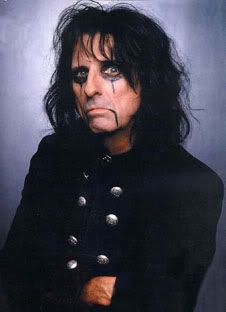
Alice Cooper
Does Not Rock

The Eagles
Rocks

Pat Benatar
Does Not Rock

Olivia Newton-John
Rocks
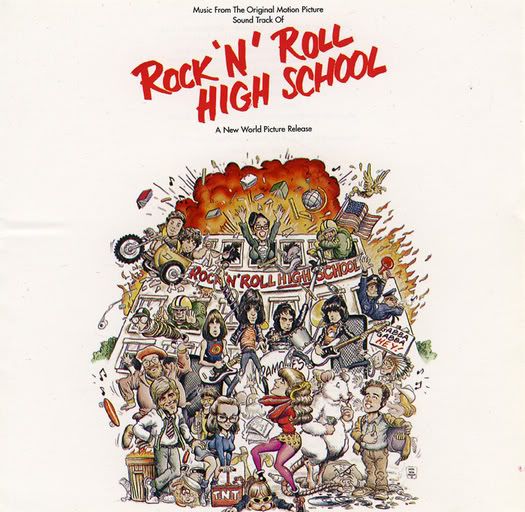
Rock 'n' Roll High SchoolDoes Not Rock
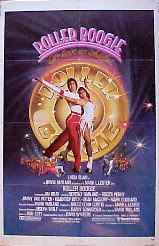
Roller Boogie
While these examples obviously speak for themselves, I feel dutybound to explain myself further--the old fashioned way. Y'know...With words....
What all of these examples in both catagories have in common is an essential cheesiness that is evident throughout their achievements, but what makes some of them
Rock, while the others
Do Not Rock, is a willingness to embrace that cheesiness with an enormous deathgrip bearhug so powerful that it actually becomes what makes them cool. By accepting their own cheesiness, they transcend it, while those that
Do Not Rock try to pretend that their innate cheesiness does not exist, which only serves to highlight how truly lame they are.
The Apple Rocks because it is never--not for one moment--ashamed of what it is. Rather than let itself be brought down by its absurd tackiness, it defines itself by it. Despite the mixed signals of its ultimate theme, it is a movie that takes the rebel stance required to so brazenly choose an aesthetic that ultimately dooms it to failure. It is the spiritual equivalent of a drag queen who goes to a straight Country & Western Bar; it knows it is going to get its assed kick, but it goes anyway--with its knee length boots on. And so, like Alice Cooper, Pat Benatar and
Rock 'n' Roll High School,
The Apple Rocks because it understands this fundamental truth; you can only feel shame if you think you have something to be ashamed about.
And though this is the major reason I love this movie, I would be remiss if I didn't point out a few of the smaller things that I enjoy about this film.
1) Catherine Mary Stewart
Though in my very long breakdown of the movie I made it extremely explicit that I did not have fond feelings for the character of Bibi, that antipathy does not transcend over to the actress who played her. Out of all the young actors for whom
The Apple was their big break, only she managed to have anything that approached a career (in fact the film marked George Gilmour's--aka Alphie--sole screen credit) and it is easy to see why, as she is absolutely adorable in a way you seldom see in movies in today (maybe Amanda Bynes, but that's pretty much it). Sure it helps that I'm automatically pulling for her since she's a hometown girl (she's from Edmonton), but she undeniably exudes a quality of likability without which Bibi would have been truly unbearable. Her career following
The Apple wasn't hugely impressive, but it did feature some memorable roles in some under-rated films, most notably
The Last Starfighter and a film that should be a much bigger cult classic than it currently is,
Night of the Comet (in which she plays a valley girl who, with her friend, takes the apocalypse in stride and uses it as an excuse to go to the mall and take all of the free clothes she wants).
2) Mr. Boogalow and Mr. Topps
Vladek Shebal and Joss Ackland were both character actors who had long, well-established careers before
The Apple and it is easy to see why. Though Shebal exudes no real menace as Boogalow, he is constantly fun to watch and plays his role with a droll charm that never wavers no matter how absurd the circumstance. While I have little good to say about Ackland's role as Hippie Leader (a fact which has more to do with my dislike for the character than his perfomance itself), his take on Mr. Topps manages to add a genuine sense of pathos and victory to an absurdly stupid ending. He even manages to make the blond wig work (which, despite 'Mato's comment to the contrary, I still insist I could pull off with aplomb).
3) I Love Musicals with Singers Who Can't Sing
As someone who grew up loving singers like Bob Dylan, Tom Waits, Leonard Cohen and Lou Reed, I have long believed that a voice that exhibits genuine character and emotion is always more interesting than anything that comes out of the vocal chords of the classically trained. That's why I've always had a fondness for musicals that feature songs performed by actors with non-traditional singing voices. When I read James Robert Parish's book
Fiasco the moment he truly lost me was when he insisted that the reason Lee Marvin's rendition of "Wandrin' Star" from
Paint Your Wagon became a minor hit on the charts was because of its "hilarious awfulness". This annoyed me, because I find Marvin's performance of the song, as it appears in the film, genuinely moving. I also adore the moment in
Everyone Says I Love You when Woody Allen sings "I'm Through With Love" in his thin, Woody Allen voice and I consider the moment when he and Goldie Hawn dance together besides the Seine to be one of the most magical scenes in film history. This is why I love "Life is Nothing But Show Business in 1994" and "I Know How to be a Master" as they are performed by Shebal. Though he is clearly not a singer (as neither was Catherine Mary Stewart, whose songs were performed by a singer named Mary Hylan) he still manages to make his numbers work as well as their relative quality would allow.
4) Colour!
Damn if this isn't a big bright rainbow of a movie!
5) Most Other People Hate It
Which is a virtue to a natural contrarian like myself.
So that, in and out and around a nutshell is why
The Apple Rocks and why it is a WWTTM I am going to keep watching and enjoying for the rest of my life.
'Nuff said.


